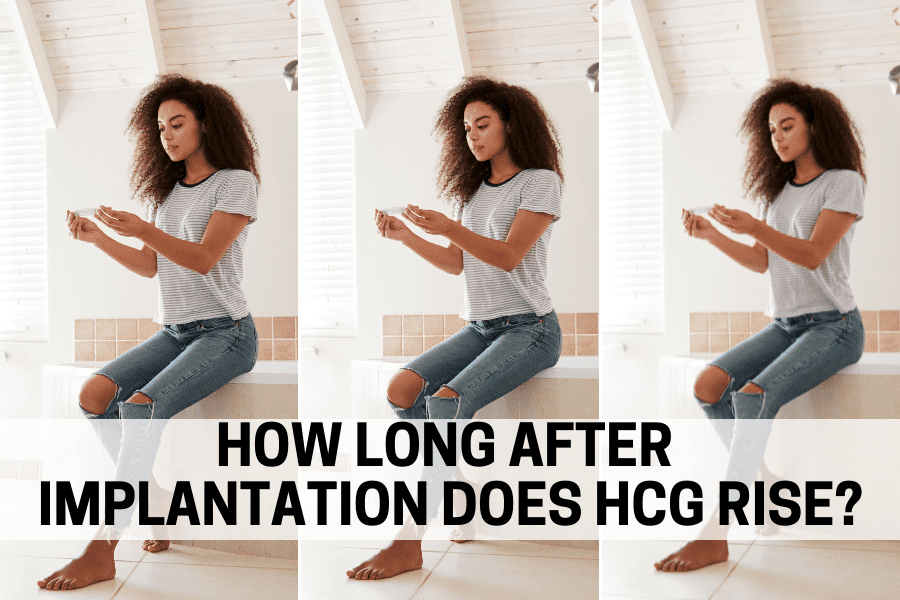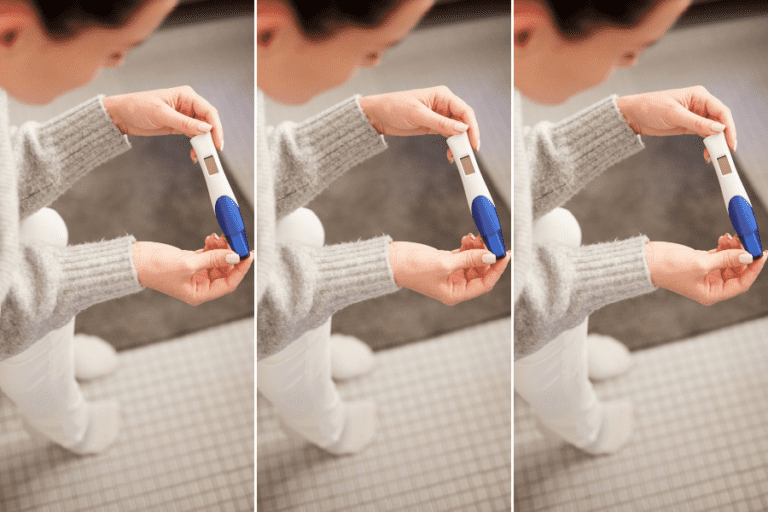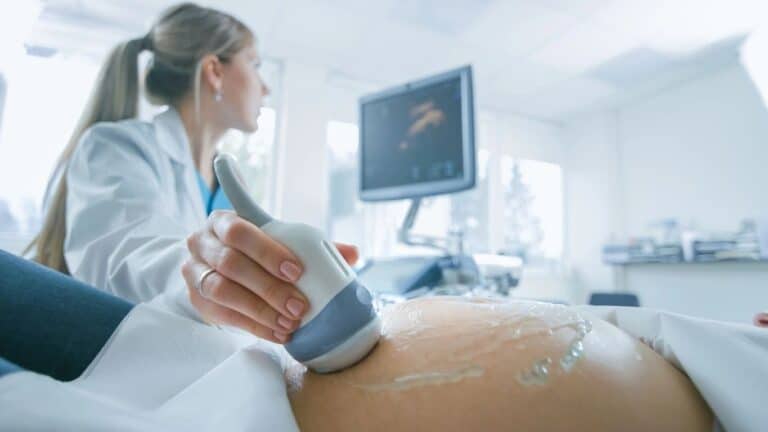How Long After Implantation Does HCG rise?

Last Updated on February 2, 2023 by Avi Steen
Want to know how long after implantation does HCG rise? This post will answer your questions about implantation and when to take pregnancy tests in your two-week wait.
Experiencing implantation can be exciting and nerve-wracking at the same time. But that’s the joy of a TTC journey right?
What happens next after implantation and how long do you have to wait to take a pregnancy test? This is a question that goes through every woman’s mind as she’s learning more about her fertility and pregnancy journey.
As a fertility coach, I am giving you more information on implantation and hopefully calm your nerves for the days ahead.
You are going to learn more about implantation, the symptoms that follow, and the best timing for taking a pregnancy test.
After learning about how long after implantation it takes for HCG to rise, you’ll know what exact steps to take in the days following so you aren’t overwhelmed in your two-week wait.
This post is all about how long after implantation does HCG rise.
RELATED POSTS:
How Long After Implantation Does HCG rise?
There is no definitive answer to the question of how long after implantation does hCG rise. The timing of hCG increases can vary from person to person and from pregnancy to pregnancy. Generally speaking, however, most women will experience an increase in hCG levels between 6 and 12 days after implantation.
HCG, also known as human chorionic gonadotropin or simply pregnancy hormone, starts increasing within 48 hours of implantation. Every 48 hours the pregnancy hormone will begin to double to increase the number of detectable levels on a pregnancy test at home or HCG blood test.
HCG can vary in all women. This is the reason that many women, like myself, can take an early pregnancy test 2 days after implantation and receive a faint positive.
While other women may have to wait longer to see a positive pregnancy test depending on how quickly their HCG rises and can be shown on said test.
How soon will a pregnancy test read positive?
In my experience, blue dye pregnancy tests have caused me nothing but pain and confusion. I always recommend a red dye test like this one to my clients looking to purchase a pregnancy test in the two-week wait.
What happens after implantation?
After implantation the pregnancy hormone, HCG will begin to rise. This pregnancy hormone will double every 48 hours.
As the pregnancy hormone begins to rise you will experience an increase in pregnancy symptoms. Check out this post to identify some of the pregnancy symptoms you might see: 26 SUPER EARLY Pregnancy Symptoms by DPO
Some of these symptoms can also be mistaken for premenstrual symptoms (PMS) so waiting to test until you have missed your period can be helpful in calming any nerves you have in the two-week wait.
About a week after implantation at your missed menstrual period you should be able to test positive for the pregnancy hormone if implantation was successful.
What is Implantation?
Implantation is the process by which a fertilized egg attaches to the wall of the uterus. This usually occurs about six days after fertilization and marks the beginning of pregnancy.
Implantation is complete when the blastocyst (early embryo) is fully embedded in the endometrium (uterine lining).
Signs of Successful Implantation
Signs of implantation include implantation bleeding, cramping, and implantation dip in your basal body temperature (BBT).
Implantation bleeding is one of the first signs of pregnancy and usually occurs around the time of your expected period. It may be pink or brown in color and is often accompanied by cramping.
Implantation cramping is another common symptom that can occur when the embryo implants in the uterus. These cramps are usually mild and only last a day or two.
Your basal body temperature (BBT) is the resting metabolic temperature your body reaches first thing in the morning after waking. Just before ovulation, your BBT may dip slightly and then rise again after ovulation. If you notice the second dip in your BBT around the time of implantation, during the two-week wait, it may be a sign that implantation has occurred.
What Causes Implantation Bleeding?
Implantation bleeding occurs when the embryo implants in the uterus and is generally considered a normal part of early pregnancy. The blood is usually pink or brown in color and is much lighter than in a normal menstrual period.

Pregnancy Test Basics
What is HCG?
Human chorionic gonadotropin also known as HCG is the hormone checked on a urine test to confirm pregnancy. Most women use an at-home pregnancy test to initially test hormone levels but this can also be completed at your doctor’s office using a blood test.
How early can a home pregnancy test show a positive result?
Most early pregnancy tests can detect the presence of HCG and confirm pregnancy 7 days after implantation which is usually right before a missed period. If completed earlier than implantation or before there is a significant amount of HCG, a false negative result could be possible.
Early Pregnancy Symptoms
The most common early pregnancy symptom is a missed period. Other symptoms may include implantation bleeding or cramping, nausea, vomiting, fatigue, and breast tenderness. Some women may also experience implantation dip which is a short-lived drop in basal body temperature around the time of implantation.
When To See a Healthcare Provider About Your Pregnancy Symptoms
If you think you may be pregnant, the best thing to do is make an appointment with your healthcare provider. They can perform a pregnancy test and help you get started on prenatal care.
Prenatal Care
Prenatal care is medical care that women receive during pregnancy. This care is important for both the mother and baby as it helps to ensure a healthy pregnancy. Prenatal care may include regular checkups, blood tests, and ultrasounds.
Your First Trimester Checkup
Your first-trimester checkup is an important appointment to ensure that both you and your baby are healthy. During this appointment, your healthcare provider will perform a physical exam, order blood tests, and may order an ultrasound.
The purpose of the physical exam is to check your overall health and to look for any potential problems that could affect your pregnancy.
Blood tests are important to check for things like anemia and infections that could harm you or your baby.
An ultrasound is a painless test that uses sound waves to create a picture of your baby. This can be used to confirm the due date, check for multiple pregnancies, and to look for any birth defects. In early pregnancy, a technician will likely use a transvaginal ultrasound.
First Trimester Bleeding
First-trimester bleeding is any vaginal bleeding during the first 12 weeks of pregnancy. This bleeding may be light spotting or heavier, like a menstrual period. First-trimester bleeding may be a sign of a miscarriage or ectopic pregnancy and should be evaluated by a healthcare provider.
Ectopic Pregnancy
An ectopic pregnancy is a pregnancy that occurs outside of the uterus, most often in the fallopian tube. This is a potentially life-threatening condition and requires immediate medical attention.
Miscarriage
A miscarriage is the loss of a pregnancy before 20 weeks. This can be a very difficult experience and may require time to grieve. Personally, I experienced a blighted ovum miscarriage where I had high HCG levels but no embryo implantation. Read more of my story here.
If you have any concerns about your pregnancy, it’s a good idea to speak with your healthcare provider.

What To Expect During Your Pregnancy
During pregnancy, your body will go through many changes as it prepares to support your growing baby. These changes can cause a variety of early pregnancy symptoms, including:
- nausea and vomiting
- weight gain
- fatigue
- swelling of the feet and ankles
- back pain
- urinary frequency
- constipation
- heartburn
It is important to talk to your healthcare provider about any symptoms or concerns that you may have during pregnancy.
So, When Is There Enough HCG To Test for Pregnancy?
You may want to wait until you’ve missed your period to test for pregnancy. This is usually around 7 days after implantation. However, some women may experience implantation bleeding which could occur around the first day of a missed period. If this occurs, you may still get a positive result on a pregnancy test.
If you test too early, you may get a false negative result. This means that the test says you’re not pregnant when you actually are. If you think you may be pregnant but get a negative result on a home pregnancy test, it’s important to follow up with your healthcare provider.
FAQ About Implantation
How Fast Does Hcg Rise After Implantation?
If you’re wondering how fast after implantation does hcg rise, the answer is it depends. It begins to be produced as soon as an embryo implants in the uterus and reaches peak levels between 8-11 weeks after implantation. But levels can vary from woman to woman.
It has been observed that concentrations of hCG double approximately every 2 days in early pregnancy. Therefore, monitoring the amount of hCG present can help show whether a pregnancy is progressing properly or if medical intervention is needed.
Is hCG Detectable 2 days After Implantation on Pregnancy Tests?
It’s possible that pregnancy tests will be able to detect hcg after implantation. Pregnancy tests of different variations could possibly detect lower levels of the pregnancy hormone.
OTHER POSTS YOU MAY LIKE:
How to Increase Chances of Implantation During the Two Week Wait
TTC Encouragement for the Two Week Wait
Implantation Symptoms in the Two Week Wait
Prayer for Successful Implantation You Can Pray During Your Two Week Wait

Octavia Steen is an NBDA certified fertility doula, health coach, certified fitness nutrition specialist, aspiring missionary with the COGIC, and owner of Mother Mindset. She helps future and current mamas become more consistent in faith + fitness and grow closer to God so they can create a healthier lifestyle from the inside out!






